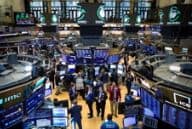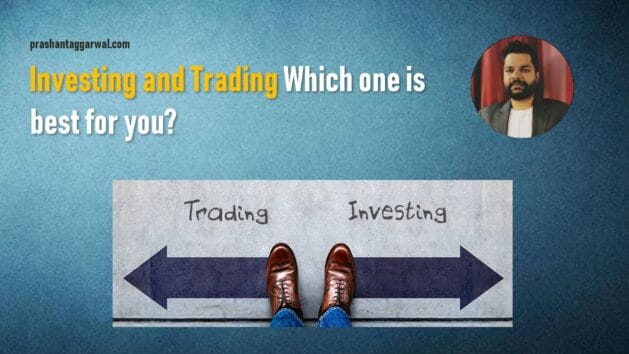
If I would ask about stock trading you would probably get the image on the right in your mind. The stock exchange trading floor, a scene synonymous with stock investing itself.
This is where traders meet in person to buy and sell stocks finding deals for their clients and employers and yelling takers in prices across the trading floor. Well, this used to be how most trades were done. These days you can do most of the work online and advancements in technology have even allowed everyday individuals to take up trading at home to try and make money.
But despite the fact that trading involves stocks and other investments is often seen as a very different practice from investing. While you’ve probably heard of people making quite a bit of money off trading. If you look at the literal definitions of the terms investing and trading you probably won’t grasp the difference between the two.
Investing is actively spending money with the hope of generating some larger benefit or return in the future.
An investor is someone who places the money in something and looks to profit from that asset growth over time
Trading is the active buying or selling of investments.
The trader is someone who makes money in the short term by buying and selling stocks frequently. In other words, while 1 relies on gradual appreciation, the other focuses on market volatility.
It’s not very clear how the two differ. In fact, there is no technical distinction dictating what counts as trading and what counts as investing but the terms are often used to refer to 2 very different approaches to making money from investments.
Now being a trader can mean a number of different things. Many companies actually hire traders to help them carry out their investment decisions. In this post, we are focusing on traders who operate with the sole objective of making themselves money and their 2 main areas wherein this practice differs from investing.
The timing of trades in the investing is typically a long-term strategy and trading is more short-term.

When you invest in the stock you’re betting that over time the company will grow either by expanding its asset base or its profits you can invest in a company for as little time as you want. But generally speaking, you’ll be aiming to sell the stock 30 years from now on a day-to-day basis the price of a stock may fluctuate and indeed some investors try to take advantage of that by buying the stock’s prices.

Trading on the other hand is the fast and furious approach that involves buying and selling investments to take advantage of short-term price swings. In trading, for example, involves individuals buying and selling stocks on the same day. There are other cells to treat as well but they all tend to fall under fairly short time frames. Sometimes even making buys and sells within a matter of seconds (Scalping) because of this traders make many more trades than investors enough to cycle through many more positions.
In the world of investing people take 2 approaches to this information, passive investors ignore short-term fluctuations in stock prices and look only to benefit from the rising intrinsic value knowing that even if they do buy overpriced stock they should benefit in the long term as the aggregate market grows.
Active investors instead try to estimate a stock’s intrinsic value so that they can buy the stock for less than it’s worth allowing them to benefit not only from the rising intrinsic value but also from the return of the price to its intrinsic level well.
It is common for traders to focus their analysis on technical indicators, these are measures engages that only take into account historical pricing information to help the trader to determine whether there is a developing trend or pattern that they can quickly exploit. It’s the graphs and charts you imagine when you think about a professional trader sit in front of their 4 screens buying and selling stocks.
There are some traders who do incorporate qualitative information into their research as well but is usually only to take advantage of a short-term shift that they’re expecting at the stock prices. For example, if a trader finds out that a company is about to come out with news tomorrow they may decide to buy the stock with an expectation that the company’s announcement will be positive leading to a jump in the stock price. In either case, traders generally only focus on snippets of a company’s information rather than trying to develop a broader understanding of the firm’s operations.
So those are the 2 primary ways trading differs from investing. All this can make trading a very alluring practice for young investors, it’s got it all in with all the eyes we see online of millionaires in their private jets explaining how they went from ZERO to HERO with their strategy.
It probably seems like a fairly easy field to enter but trading is a high-risk practice where most traders put a lot of money behind their individual traits sometimes even borrowing to leverage their returns, which exposes them quite heavily to the short-term volatility of individual positions.
It also requires a lot of effort and time, many trades only end up yielding a fraction of a percentage point many traders are continually rolling their money into new positions, and honestly, when it comes to amateur traders the truth is that there just isn’t that much working in your favor with such a narrow time frame.
You’re often forced to make decisions on fragmented information and we consider that you’re competing with industry professionals with copious amounts of money cutting-edge research and even industry-best algorithms. They can trade faster than you can say the word stock, it’s just not a fair fight.
Now I’m not saying you can’t make money trading. There are people who make a full-time living from their homes with trading activities. Some companies even offer salaried positions for traders as we mentioned earlier. So there is some merit to the field but training is a lot like playing poker, you can be very good at it and indeed some people do make a living from it but there’s a lot of chance involved with other great players at your table.
The odds are often not in your favor so any adviser will probably tell you that in that scene is the better way to go for the average person.
If you found my post useful then do share it with your friends and colleagues. If you have any feedback/questions, you may leave a comment below.



